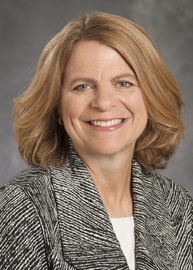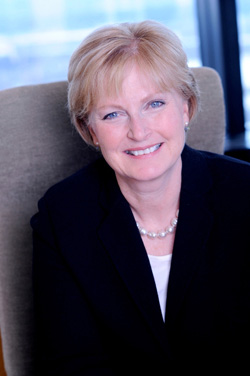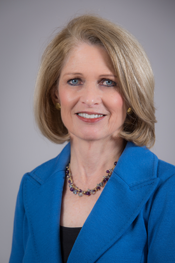Auto logout in seconds.
Continue Logout
This interview with Penny Wheeler, president and CEO of Allina Health, was conducted by Eric Larsen, managing partner, and condensed by Amanda Wolfe, senior director.
Q: You're an ob-gyn, you led the medical staff at Abbott Northwestern Hospital, and in 2006 you became Allina's chief clinical officer. You're now president and CEO. One of my favorite quotes of yours is you said you were depressed in your first year as an administrator because you missed patients so much.
Penny Wheeler: I went right from being a full-time practicing physician who also served on Allina's board to being its chief clinical officer. I didn't come through the traditional ranks, nor did I study hospital administration.
I felt a little bit depressed at first because not only did I miss my patients, but I felt like a fish out of water. I've compared it to feeling pretty comfortable doing a complex hysterectomy with a lymph node dissection to not knowing how to even run my email account.
Q: In a Modern Healthcare profile, you lamented the fact that there are so few women leading enterprises like Allina. What are your thoughts on women leaders in health care?
Wheeler: What I've come to realize is how few female physician leaders there are.
There's a Harvard study that looked at leadership traits. Women scored pretty well on the ones you would think of as nurturing: relationships, long-term outlook, and mission. But they also scored highest in drive for change and performance, which was interesting to me because that wouldn't be what we'd traditionally think. The only thing that women scored lower on overall was on strategy. But when you broke that down, in terms of position or level, women and men scored the same on strategy.
Sometimes there's this dichotomy between wanting to be liked and wanting to drive for change and performance. How do we balance being able to be liked and being able to be driven? I say the real way to bridge it is through purpose. You can be really driven if you're committed to a purpose. I think that's true of any leader, whatever their gender.
Q: How do you think about your own leadership style?
Wheeler: I went through a leadership profile about two years ago, and they told me, 'Here's the problem with you. You're too empathetic. You're off the charts for executives in terms of empathy.'
That is a wonderful thing for a physician to have, but they said I'd have trouble with it as a leader. They said I would give people second, and third, and fourth chances when they're not necessarily moving things forward. They said to be mindful of that as a leader.
From the Care Transformation Center
Empathy: A common ingredient for happy patients, staff, and marginsI hope that I bring that empathy in the right way as a caregiver, to really say, 'Okay, we're instituting this, or we're getting this changed.' First of all, we're really, really trying to have the people who are next to the patients' elbows drive the change in our organization. If it doesn't come from them, then we don't know enough about their work to know how to drive change.
Q: I read an interview where you were asked how you know that you're getting the right talent. Your response was that you ask candidates a few specific questions. I tried to answer these myself and they were really tough, so I figured it would be perfectly opportunistic for me to ask you one of them now. What's the biggest misconception about you?
Wheeler: I think this gets to that point that we talked about earlier. About empathy and nurturance that comes with who I am. I think people assume, 'Oh, you know Penny, she's kind, she's good-natured.'
When it comes to pursuing our mission and what makes lives better, I feel a tremendous obligation and responsibility and privilege to be serving as many lives as we do. I tell people in our organization that we have to be intolerant of things that get in the way of good care, just completely intolerant.
And so I'd say that the misconception might be that I'm the nicest person in the world. In some ways that's true—I'm nice, but I have a drive and a passion, as well an expectation that people bring their best to work and performance.
Forming partnerships
Q: One of the things that I'm struck by in your leadership style is that there's actual substance, not just rhetoric, behind collaboration in favor of competition. And you have architected out some unusual partnerships, particularly your collaboration with Children's Hospital of Minneapolis. How did that come about?
Wheeler: Children's Hospital of Minneapolis is not part of our system, but it has the best outcomes for premature infants in the country. We were talking for a while about building a NICU across the street from them. A NICU was attractive, partly because of the low-volume, high-revenue potential, but it didn't make any sense to put such a facility right near Children's.
There was already synergy between our doctors and Children's clinical team. We formed a contractual joint venture where we valued each of our services and combined them together. We still have our separate organizations, though.
A few years ago, we co-built a facility that's close to Children's. At the time, the birth rate was flat or declining, and we thought we'd have maybe 1% to 2% growth, but we reached 23% growth in the first year.
It's worked smashingly. The community benefits. Each organization benefits. And now we've expanded the partnership to two of our other health campuses.
Q: On a similar note, you're working with Health Partners as part of an ACO. What's the story behind that partnership?
Wheeler: This is another instance of avoiding the tragedy of the commons. We had five clinics, and Health Partners had four. We had the hospital in Northwest Metro market. So instead of duplicating services, we thought, 'What could we do together?'
Health Partners, besides having a provider arm, also has a health plan arm. At that time when we started the partnership, they had about 27,000 health plan participants, and we were going agree to collaborate on quality and share in the savings that would accrue to that. We were at 8% medical cost increases when we started, and the market was about a 5% inflationary rate, and now we've dipped way below the inflationary rate. Even better, people have improved access to mental health services. There are more urgent care services available. Our readmissions have dropped, and there's more colon cancer screening.
The field guide to hospital partnership and affiliation models
We've actually worked together and learned from each other. 'Gosh, you have a shared decision making tool there. Boy, we don't have anything like that. Can we help do that?' Or, 'You have a great model for diabetes care here, and we're not getting quite the same results. What can we do?'
Q: Allina appropriately got a lot of press coverage and curiosity around what you're doing with Health Catalyst, which is a 10-year, $108 million partnership, 80% of which is fixed and 20% is outcomes-based. Given how unusual the arrangement is, can you explain the conceptual thinking behind it?
Wheeler: We came together when there were just two principals at Health Catalyst, building their enterprise data warehouse. We built a lot of intellectual, predictive models for readmissions and things like that. Then we separated and rejoined under this new partnership.
We exchanged some of our intellectual property for a small equity stake in Health Catalyst. And then we have an agreement where Health Catalyst employees in their managed service arm are our employees. Through that, we get all the tools and everything that Health Catalyst brings. We pay them obviously for being our managed service arm for our organization. Hence, the $108 million.
And then 20% of it is at risk for outcomes, which I think is relatively new, but hopefully a wave of things to come in the future about how well we perform on quality measures, and how well our quality translates into experience and affordability.
Improving community health
Q: I read an anecdote about your cancer care program, where you were able to stop readmission for 95 cancer patients. You saved the community $1.2 million, but you sacrificed $600,000 of your own revenue. Can you talk about that tension?
Wheeler: A huge tension that exists across health care is where the economic and financial performance doesn't necessarily equate with patient outcomes. We can do really well when the community is really sick with something. And we can do really well when people are coming back into our hospitals. And we can do really well when people are having complications.
But, why would we want that? We were trying to learn that for a while through the Pioneer Accountable Care Organization, to think about when rewards are for outcomes, and how do we have to act and behave, and what do we have to pay attention to. We're trying to get ready with all those components we need from integrated databases and the data infrastructure we needed to tell people how well they were doing and at what cost. We set our training wheels out really wide for Pioneer, and so we haven't achieved the savings where we get a check paid to us.
Now we feel like we've learned some things, and people aren't moving us to outcomes-based payments as quickly as we thought. Part of our strategy is to disrupt the market by moving toward outcomes-based payment. We'll do that through contractual arrangements, and we'll do that by becoming probably more tightly integrated with a health plan or a provider-sponsored plan than we've been in the past.
We were divorced from a health plan, now 15 years ago, and boy, do I wish that we had them back.
Q: That's so interesting. We're seeing these new plans from providers proliferate, and I can count on two hands, if I'm being generous, those that have actually worked. It seems to require a different kind of collaboration with payers. Is Allina thinking about starting a health plan?
Wheeler: We can't right now without shooting ourselves in the foot. We have a competitive need to get closer to that, and we have willingness in the market to think about it from a payer-provider perspective. We will not build our own health plan. We know what we don't know. As we say sometimes, we're smart enough to know how dumb we are.
Final reflections
Q: I'm always fascinated to hear how folks answer this: As you reflect on your career, Penny, what are you most grateful for?
Wheeler: Wow. I'm incredibly grateful for this opportunity. And like I said, I was not literally clinically depressed, but it was a tough first year, and I'm most grateful that I actually took that leap, even though I didn't feel it at the time. One of my patients was kind of upset that I left practice, and she said, 'Okay, I think I finally get it, right? You used to work for people you know and try to do good things for them, and now you're trying to work for a whole lot of people you don't know, right, and try to do good things for a lot of them.' And I said, 'Yeah, that's pretty much it.'
It's a privilege to work with such a talented group of people and to try to do it in the service of improving people's lives. Don Berwick said health care is more about love than anything else, because it's about one person trying to relieve the suffering of another, and if that's not love, I don't know what it is.
I am fortunate to be able to talk about things like love and leadership, perhaps with greater permission because of my gender. And why not embrace those things, because at the end of the day, it's a lot of what this is about.
Get more lessons from the C-suite
See the Daily Briefing's archive of must-read interviews with other top hospital and health system leaders, including:
What Johns Hopkins' CEO thinks about hospital rankings
Johns Hopkins Medicine CEO Paul Rothman discusses how his health system's mission brought it to Saudi Arabia—and how the system addresses health disparities close to home, too. Read our interview with Paul.
 How a CEO's cancer diagnosis changed this health system
How a CEO's cancer diagnosis changed this health system
Mary Brainerd, president and CEO of HealthPartners, talks about her system's efforts to "out-MinuteClinic MinuteClinic" and its experience as a provider, insurer, and pharmacy. Read our interview with Mary.
 Yale New Haven CEO's journey from unit secretary to the C-suite
Yale New Haven CEO's journey from unit secretary to the C-suite
Marna Borgstrom, president and CEO of Yale New Haven Health System, talks about her approach to partnerships, the future of academic medical centers, and how a deal with Tenet fell through. Read our interview with Marna.
Don't miss out on the latest Advisory Board insights
Create your free account to access 1 resource, including the latest research and webinars.
Want access without creating an account?
You have 1 free members-only resource remaining this month.
1 free members-only resources remaining
1 free members-only resources remaining
You've reached your limit of free insights
Become a member to access all of Advisory Board's resources, events, and experts
Never miss out on the latest innovative health care content tailored to you.
Benefits include:
You've reached your limit of free insights
Become a member to access all of Advisory Board's resources, events, and experts
Never miss out on the latest innovative health care content tailored to you.
Benefits include:
This content is available through your Curated Research partnership with Advisory Board. Click on ‘view this resource’ to read the full piece
Email ask@advisory.com to learn more
Click on ‘Become a Member’ to learn about the benefits of a Full-Access partnership with Advisory Board
Never miss out on the latest innovative health care content tailored to you.
Benefits Include:
This is for members only. Learn more.
Click on ‘Become a Member’ to learn about the benefits of a Full-Access partnership with Advisory Board
Never miss out on the latest innovative health care content tailored to you.
